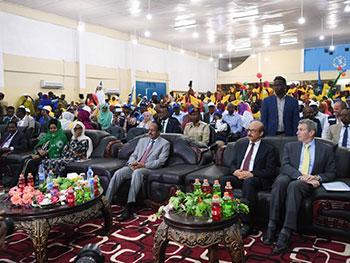Mogadishu, 14 August 2017 – An event attended by the President of Somalia, parliamentarians, delegates from the Somali Ministry of Health, World Health Organization and UNICEF, was held in Mogadishu to mark a milestone occasion: 3 years since the detection of the last case of wild poliovirus in the country.
Speaking at the event, WHO’s Regional Director for the Eastern Mediterranean, Dr Mahmoud Fikri, applauded Somalia’s efforts to ward off the crippling and highly infectious virus but urged continued caution.
 Read the photo story
Read the photo story
“The absence of cases of polio in Somalia today is testament to the leadership, commitment and hard work of the Government and people of Somalia, and the effective support and collaboration of many partners,” Fikri said. “We need to remember however, that Somalia is at risk of reinfection and we must stay vigilant,” he said.
Somalia stopped endemic poliovirus transmission in 2002 but has been twice affected by importations of the virus. The outbreak that erupted in the Horn of Africa 3 years ago paralysed close to 200 children. Somalia was at the epicenter and most affected, accounting for more than 90% of these cases.
“The polio programme in Somalia has fought hard to raise population immunity levels [against polio] across the country and to improve surveillance system sensitivity to pick up traces of the disease,” said Fikri. “This is commendable, but there are still gaps we must continue to work to address,” he added.
Insecurity and inaccessibility are key challenges for humanitarian partners operating in Somalia, particularly in the southern and central zones. For the polio programme, aiming to repeatedly reach every child under 5 years of age with vaccine, innovative approaches are proving effective.
“Tools have been developed to help us map and track the movement of nomadic pastoral communities, so that we can reach children on the move,” said Dr Ghulam Popal, WHO Representative to Somalia. “In addition, locally recruited village polio volunteers are helping us administer polio vaccine in and around places we cannot access. These volunteers also play a key role in helping to find and report cases of acute flaccid paralysis which is an indicator for polio,” he added.
The 3-year polio-free celebration comes amidst the worst outbreak of measles the country has seen in years. Somalia is also still responding to an outbreak of acute watery diarrhoea/cholera, which began in January. Polio systems and networks are being used in both interventions.
“Polio infrastructure has been critical in responding to these other serious outbreaks,” Fikri said. “We thank our donors and urge the international community to continue to support efforts to keep Somalia polio-free, and other much-needed health interventions in the country,” he said.
Certificates of appreciation were presented to select individuals for outstanding contributions to Somalia’s anti-polio effort.
Somalia’s last case of polio was a child from Hobyo district, Mudung region.
Only 9 cases of polio have been reported worldwide in 2017.


